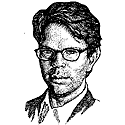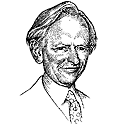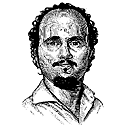Illustrations by Lars Leetaru.

Gary Shteyngart
The Russian Debutante’s Handbook
I started writing The Russian Debutante’s Handbook in 1994, when I was a senior at Oberlin. I worked like a dog, writing 150 pages while doing a senior thesis. Then I moved to New York and started working as a paralegal. My parents had plunked down $100,000 for my liberal-arts education and wanted me to be a lawyer or something professional, so I took the job. It was awful—frankly, I could care less about the legal process. I was living in this studio that faced a giant air shaft on the Upper West Side—in this stuffy asinine building I despised—and I’d get home feeling exhausted and oppressed, but also thinking, The hell with this, I’m gonna show them! I wrote about 200 pages, mainly at night—it was a kamikaze mission of sorts. Then I almost had a breakdown and went to Spain for a few months. It was funny: I had 24 hours a day to work on the book and got nothing done. I came back to New York, lived on the Lower East Side—I was part of that crowd with the stupid hipster clothes—and worked a string of low-pressure nonprofit jobs and finished—seven years’ work total. How it got published is probably not the norm: I was applying to M.F.A. programs, to help get some structure to the book, and was choosing between Cornell and Hunter. I figured, Okay, you gotta go to Cornell, but I knew Chang-rae Lee taught at Hunter, and he’s one of my favorites. So I wrote him, and he asked for the book, then sent it to his editor at Riverhead, who called me a week later wanting to buy it. That was crazy and has changed everything. But looking back, I see I work much better under pressure. Those early times were the glory years. Now that I don’t have to worry so much, I find I work at a much more glacial pace. I should probably go out and work for some accountant.

Jonathan Franzen
The Corrections; How to Be Alone: Essays
I was 16 when I first saw New York. I spent a long, perfect August afternoon here with a cousin I had a crush on, and by the end of the day I was thinking, This is the place for me. When I started out as a writer, though, a few years later, I was afraid I’d get eaten up if I moved to New York and be demoralized by the competition and spend all my time earning money. So this is still the advice I give to young writers: Go to, like, northeastern Ohio, and write your first book. Go someplace cheap, and move to New York later.
I went to Somerville, Massachusetts. I’d gotten the idea for my first novel [The Twenty-Seventh City] when I was about halfway through college. After graduation, I studied for a year in Germany and married my college girlfriend. The rent on our first Somerville apartment was $300. I found a job at the seismology lab at Harvard and worked twenty hours there every weekend. The other five days a week I wrote fiction. It took my wife and me about four years to get completely fed up with Boston. We finally reached the point where it was like, if we don’t get out soon, we’re going to die of being here. We went and looked at marginal apartments in Manhattan, a bunch of grim places that we still couldn’t afford, in Hell’s Kitchen and under the 59th Street Bridge, and we finally ended up settling in Jackson Heights. By that point, a young agent, Susan Golomb, had managed to read all three manuscript boxes of The Twenty-Seventh City, and I’d done some serious pruning of the book. Susan sold the book to Farrar, Straus three weeks after I moved to Queens. It was this incredible housewarming present.
Back then, I thought a teaching job was the ultimate reward for writing a good book. I thought maybe I could publish a couple of books, they wouldn’t sell, but they’d be nicely reviewed in the Times, and we’d move to some nice college town and have the nice middle-class life we’d always thought we wanted. But when I did finally do some teaching, it completely ate me up. I was spending three days a week on one class, and it just didn’t seem compatible with writing novels in the long run.
The thing that saved my life was magazine work. By 1994, I’d spent all the money I’d made on my first two novels, and I was living in a $150 room in South Philadelphia. That’s when The New Yorker took a big chance on me, on the basis of pretty much nothing but my novels, and assigned me to write a 15,000-word piece on the Chicago post office. I lucked into a good story in Chicago, and the day The New Yorker accepted it was one of the happiest of my life. After that, I knew I could survive financially, so I moved back to New York.
The best part of magazine work for me, even more than the money, was that it counteracted the loneliness that comes with writing fiction, where you get to work with an editor once every five years. Of course, it helped that I didn’t have to start out doing 500-word profiles of sitcom starlets. The lamest assignment I ever took was to write a piece for Details about buying my first suit. The deal was for $2,000 plus a free suit. I wrote the thing and got a suit from Barneys which I still wear. The real bonus, though, was that Details never ran the piece.
Over the years, I’ve tried to leave the city many times. Europe is nice, and a place like Philly makes more sense financially. But New York is still the only place where people don’t ask me, “Why are you living here?” And where I don’t ask that myself. Living in New York makes me feel safe, safe from questions, and safe professionally. I like the proximity to the industry I work in. It demystifies how contracts happen, how advances are determined, how a review gets assigned, the size of reviews, even the content. Publishing loses that inaccessible, magical quality when you live in New York. If you’re out in Oklahoma trying to figure out why X book is reviewed in the Times and yours is not, you can stir yourself up into a horrible rage or paranoia. Living here by the sausage factory, I take things a little less personally.

Tom Wolfe
A Man in Full; The Bonfire of the Vanities; The Right Stuff
I went into newspaper reporting straight out of grad school, all the time considering it a cup of coffee on the highway to the glory of writing novels. I did a paper in graduate school involving census figures that showed where writers lived, and, of course, they were overwhelmingly in New York. So I figured I had to get there. I immediately tried to get work on a newspaper in New York—knowing you need to be here to really get into the whole swim of publishing—but I struck out. So I went to work for the Springfield Union in Massachusetts and then the Washington Post, still obsessed with the idea of writing novels. Then, when I finally got a job at the New York Herald Tribune, I found I was terrifically impressed by what Jimmy Breslin and Gay Talese were doing. Right then, I forgot all about fiction. Their form of journalism was so much more experimental and alive than anything novelists were doing. Newspaper and magazine work gives you little glimpses of glory all the time—the world doesn’t really notice anything you’re doing, but you see your name in print and think you’re very important. When I started doing magazine work for New York and Esquire, I was making a living, but nothing extraordinary. In the early days, I still needed my work as a newspaper reporter and freelancer for magazines, no matter how many books I turned out. It wasn’t until I published The Right Stuff in 1979 that I had a real financial cushion—and I had to publish three books of nonfiction just to support the writing of that one. I was about to start work on a nonfiction novel about New York when I thought about fiction again—for the first time in 25 years. I was 57 when The Bonfire of the Vanities was published. In this day and age, I’ve become convinced that we’ve got to put the American novel on life support. It’s nonfiction that really matters today in the literary sense. Still, like most writers, I like to think my last thing was my best, and that was a novel.

Jennifer Egan
Look at Me; The Invisible Circus
After graduating from college, I spent two years in England on a scholarship. The whole time I had an inexplicable yen to be in New York and found myself washed up here toting a horrible manuscript that I thought was great—the last time I ever thought that about anything I’ve written. This was the fall of 1987, when McInerney, Ellis, and Tama Janowitz were stars, and I fully assumed I’d be one of these people. Unfortunately, no one liked my novel, and I took a string of dull temp jobs, sneaking floppy discs to the office and writing when the boss wasn’t around. Also, I worked for a bit reading the slush pile at The Paris Review—a thrill because I got to go to the parties. I was so close—except whenever someone asked what I did and I said, “I’m working as a temp and trying to write,” they’d lunge for the hors d’oeuvre table. My big break—if you want to call it that—was a job I got as a personal secretary for the countess of Romanones, who was famous for writing The Spy Wore Red, about her experiences as a glamorous spy during World War II. She was a grueling, punishing boss—I remember her complaining that I reeked of garlic and still get a childish joy when eating something garlicky—but the hours gave me time to write in the mornings. I sold two stories, one to a tiny literary magazine, the other to The New Yorker, which ended up being my first published piece. After two years, I left the countess and scraped by with an NEA grant, writing for Cosmo, under a pseudonym, things like that. In 1992, I hit another bad low. I had an agent at that point, had finished my novel, and when I sat down and read it, I thought, This is terrible! I was pushing 30 and thinking, Oh, my God. What am I going to do? I stumbled into a job at the Tribeca Film Center and eventually understood that the book just needed work and sold it in 1993. That’s when I felt, to a degree, that I was “in the game.” But don’t get me wrong. I still feel like I’m just bumbling along. For example, I need to sell a novel by next year and have no idea what I’ll do if I don’t.


The Write Start
First-time novelist David Amsden talks to New York authors about how they got started.

Poison Penmanship
Dating a writer and seeking revenge? Write back!

Augusten Burroughs
Dry; Running With Scissors
I’ve been writing my whole life, but I never realized I was doing it until I was much older. My mother was a writer, and she was so crazy—she sent me to live with a psychiatrist when I was 12, who was crazy himself—so I always assumed doing so meant a hard and unhappy life. At 19, I ended up in San Francisco, writing ad copy for the Beef Industry Council, some of which got some media attention. When I had enough money, in 1989, I moved to New York, where I always wanted to live, and started working in advertising. That was a weird time. On one hand, I was this professional, and on the other, I was a total wreck, doing anything I could to forget my childhood, smoking crack with prostitutes in the South Bronx, going bankrupt by charging $60,000 at the Odeon—basically, I was Drew Barrymore on a smaller scale. All the while I was writing, working on something that I just called My Mess. I never considered working in advertising “selling out” the way I’m sure a lot of writers would. I mean, the last grade I ever completed was fourth, and I always figured I’d end up as a gas-station attendant. So it was great work and great training. I really learned how to cut things down, how there is no such thing as “waiting for inspiration,” just working no matter what and hoping something good happens. Eventually, the novelty wore off, and I started to really hate it and figured it was time to go into books. I had My Mess, but figured, for some reason, that you needed to have a novel, so I wrote Sellevision in seven days. After that, I figured I could show my agent My Mess, which had grown into 1,800 pages about my early times in New York. He managed to sell it, and then I was transformed, knowing that I could write about this stuff. Funnily enough, I told my editor about my childhood, and they decided they wanted to do a book about that first, and they’d put off the next one, Dry (published in May). That’s how Running With Scissors happened. The day it became a best-seller was when I quit advertising for good.

Edward Albee
The Goat or, Who Is Sylvia? Who’s Afraid of Virginia Woolf?
I came a very long distance to reach New York City—seventeen miles, from Larchmont, where I was very unhappy living with my adoptive parents in this stiff, right-wing Republican world. I was 20 years old, I knew I wanted to be a writer, so I packed a single bag, and that was that. New York was a very different place then—you didn’t have to worry about things like tiny $2,000-a-month studios. My first place was sharing a three-room apartment on West 10th with nine other people. Then I moved into a great cold-water flat in Little Italy that was $18.50 a month. It was a great time for the arts—you didn’t need any money to see shows, nobody had agents or anything like that. As for work, I made sure not to take anything that was a nine-to-five, nothing where I could be considered “an employee,” nothing that could turn into a career. My favorite job was delivering telegrams for Western Union—basically meandering around the Upper West Side. Nights were spent mainly at the San Remo bar on Bleecker Street—it’s long, long gone—drinking and talking until very late. And somewhere in there I was writing. First it was poems, which lead to a wonderful collection of rejection letters. Then I tried writing a play when I was 28, which became The Zoo Story. With a play, your goal is not to get it “published,” but produced, and how it happened for that play was very strange and lucky: I sent it to a composer friend, who then sent it to a composer friend in Italy, who sent it to a Swiss-German actor, who translated it and arranged for it to debut in Berlin. That won me some pretty great press, considering it was the fifties: American playwright has to go to Germany to stage first play. I boarded an ocean liner, and spent most of the time there watching the audience. That’s when I was convinced I was a real playwright. Back in New York, Richard Barr had gotten ahold of it and optioned it for an Off Broadway run at the Provincetown Theater. It ran for four years. At Western Union, I was making $38 a week; the play made me $60, and so I quit. It’s funny, people have written about that time in my life as if it was filled with unhappiness—because my adoptive father died, and I didn’t talk to my adoptive mother for 26 years—but that’s not the truth. Granted, it was a long time ago, but as far as I remember, I was quite happy then.

Alice McDermott
Child of My Heart; At Weddings and Wakes; Charming Billy
Growing up in Nassau County, Long Island, I used to take the LIRR into the city whenever I was allowed—often when I wasn’t. I always wanted to live there, and, years later, it finally happened. I had just finished graduate school, and my husband was at Cornell Medical School. We had this great deal for 1980: $360 a month for student housing, a one-bedroom on East 70th Street. I spent every day going to the medical library at New York Hospital to work on my first novel—it was still legal pads and pens back then. I liked going there because it was sort of my office—a comfort since almost everyone I knew was starting to have careers that required real offices. For money, I read the slush pile for Redbook—back when they used to publish fiction—for 40 cents a manuscript. Once a week, I’d go down to their Park Avenue offices, fill up a Bloomingdale’s bag, and read away. That’s when I started to feel I’d begun to infiltrate that “literary world.” I also read young-adult novels for Disney, writing synopses for potential movies, and reading novels for Esquire to consider excerpting. When I had 100 pages of the novel written, I showed it to a writer friend I’d studied with named Mark Smith, who told me to send it to Harriet Wasserman, who was known as Saul Bellow’s agent. I remember walking to her office, nervously slipping about 50 pages under her door, and running away, all the while thinking: Okay. This is impossible. Now you have to get a real job. But then she called, invited me in, and a week later Jonathan Galassi, who was at Houghton Mifflin then, gave me a contract. Just like that—it was amazing to see that there were actually people in New York who cared about helping young writers. Sadly, soon after, my husband finished graduate school and we ended up having to leave New York for his post-doc studies. I haven’t lived in Manhattan since then.

Jeffrey Eugenides
Middlesex; The Virgin Suicides
I moved to New York in 1988 for the unliterary reason of having been dumped in San Francisco. It was time to flee the West Coast. Tony Bennett was singing on the soundtrack as my beleaguered Volkswagen smoked into Manhattan, loaded with all my worldly possessions. To the extent that I have ever been truly broke, 1988 was it. I had neither job nor savings. My broken heart accorded with all these troubles. My dire prospects went with how I was feeling.
But New York brought me luck. I bought a lottery ticket my first week and won $75. The next week I got a letter from The Gettysburg Review, accepting a short story of mine. It was my first.
I was 28 and had been set on being a writer since the age of 15. I had gone about it as methodically as somebody might become a dentist. I chose my college on the basis of the writer I most wanted to study with. I majored in the English honors program because it required me to study the entire literary tradition. I also took as many creative-writing courses as I could. I was monomaniacal about being a writer. But my monomania was dull. It consisted mainly of training myself to sit for long periods alone in a room.
From Virginia Woolf I had picked up the idea that you shouldn’t publish a novel before the age of 30. This made sense to me, partly because I didn’t know how to write a novel and partly because the activity of writing had always taken precedence, for me, over the product. I’d been writing for years and reading all the time and studying to get to the point of publishing a book. I was serious but not at all professional. In retrospect, this was the happiest time for me as a writer.
And yet that can’t be true. Because as I approached 30, I began to suffer. At parties, when people asked me what I did, I said, “I’m a writer.” The next question, like a handgun, was automatic: “Have you published a book?” Whereupon I did my best to smile, ignoring the neat little hole in the center of my forehead.
All this time in New York, I had been earning my living as executive secretary for the Academy of American Poets. On weeknights, I wrote fiction for two hours. On weekends, I wrote four hours a day. I also wrote at work, while pretending to type letters. The book I was writing was The Virgin Suicides. I submitted the first chapter to The Paris Review; George Plimpton liked it and published it; Lynn Nesbit read it and offered to represent me. I said yes. Then I kept writing the book for another two years.
If it hadn’t been for extraneous circumstances, I might still be writing it. But my clandestine fiction writing, it turned out, was no secret to my boss. In the spring of 1992, he canned me. I finally finished my novel.
My dream had always been a simple one: to have the time to write. My first book—published three years late, at the age of 33—gave me that. I was now a “published” writer. I had taught myself to sit alone in a room. The trouble now was to get myself to leave it.
David Amsden’s novel Important Things That Don’t Matter is published by William Morrow.